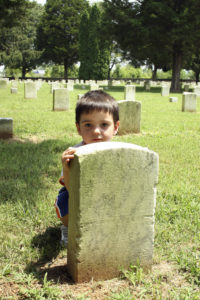 Today’s reflective post on helping a child through a death of a parent was written by South African mom blogger Amelia Meyer, who blogs at Suddenly a Mom.
Today’s reflective post on helping a child through a death of a parent was written by South African mom blogger Amelia Meyer, who blogs at Suddenly a Mom.
My daughter was five when her biological mom (BM) died suddenly. Then, less than a year later, I came into her life as her new mom (a term she chose before we were even married). In the first few months of our marriage, there were tearful nights where she missed her BM, and we went through hours of gentle conversations about how she felt. Then, gradually, there were fewer tears and shorter conversations. She didn’t forget her BM. In fact, three years later, she still occasionally mentions her; usually in reference to a memory of visiting somewhere special or hearing a particular song. But, the real, raw sadness isn’t there anymore. And that was really our goal. Not to erase her BM with a replacement model. But, for our daughter to acknowledge the loss, work through the feelings, and move forward.
So, while neither my husband nor I are experts in this arena, I’d like to share what we’ve learnt from our experience and from a lot of the info that we read on it. There’s a handy breakdown of what to expect from bereaved children of different ages on this site.
 There are no rules. Everyone grieves differently and has their own way of wading through their emotions. So, while my daughter needed to cry and cuddle when she was sad, others may need to express themselves through play therapy, sport or writing their feelings down. As the parent, you may have to guide the process – in a time of such sadness, children and teens often don’t know how to express themselves. So, suggest different things until you both figure out what works for them.
There are no rules. Everyone grieves differently and has their own way of wading through their emotions. So, while my daughter needed to cry and cuddle when she was sad, others may need to express themselves through play therapy, sport or writing their feelings down. As the parent, you may have to guide the process – in a time of such sadness, children and teens often don’t know how to express themselves. So, suggest different things until you both figure out what works for them.- Have a timeline in mind. Little ones are not able to harness their emotions or see context in the way that adults can. So, allow grief and mourning, but also encourage moving on. After a while, my daughter would only get teary and want to speak about her BM when it she was pushed to get to bed or being told to finish her salad. Although we could see the attempt at (very normal) manipulation, we had to be sensitive. I found that being empathetic and saying something like, “Shame, my love, it must be hard. Let’s talk about it when you’re finished your salad” worked best. Usually, she forgot all about it before the last leaf was gone.
- Don’t suppress your own grief. As the biological parent, you’ve also lost someone that was once pivotal in your life. Take the time to work through your loss, not pushing it down to look strong for your children. This will only lead to an eruption somewhere down the line. Consider counselling if you’re feeling unable to work through the various stages and degrees of grief. Seeing your reasonable degree of grief may also help your kids to express their own, since you’re their example.
- Recognise that feelings and behaviours that emerge may be related to the death of their parent, even when they seem totally random. So, problems with homework, tensions in their friendships, attitude changes, changes in sleep patterns, and so on may have more to do with the internal frustration of having feelings that seem too big to handle. Often, children struggle with unexpected emotions when a parent dies. They may feel guilty that they couldn’t save their parent. Or, they can feel angry at the parent for ‘leaving’. Your role is to acknowledge the feelings, reassure the child that there is nothing wrong with feeling this way, and recognise that this is their way of sifting through the many emotions swirling around inside. Don’t berate them or tell them not to feel a certain way.
- As the new parent that fills the role of the parent that died, it is crucial to allow your son or daughter to retain some kind of relationship with their deceased parent. Don’t try to carbon-copy them and don’t pretend they didn’t exist. Never discourage the child to talk about them and never speak of the biological parent in a negative way. That’s not your place and it will only cause massive issues between you and your child in the future. One of the best gauges of how my daughter was feeling was a photo of her BM that I had framed and put in her room. At first, she loved it, even packing it with her when we went on holiday. Then, she took the initiative and put it in the top drawer of her desk. A few months later, she moved it down to a lower drawer. Eventually, she put it in the garage. Last week, I reminded her that she needed to sort her stuff in the garage out and donate what she wasn’t going to use to other kids. She said, “We can donate it all, I’ll just put that picture of {BM} aside so we don’t give it away”. She hasn’t forgotten; she’s just moved forward.
- Take your child for counselling. Teens may be able to communicate with a formal counsellor, while little ones probably respond better to play therapy. You may be surprised at what comes out in these sessions, which give kids the opportunity and platform to express things that they may otherwise have bottled up.
Also, the advice I’ve found for children may be useful to the parents reading this. When grieving the death of a parent, children need to:
- Get enough rest – sleep deprivation has been used as torture, it’s no joke. And, when the mind is racing and the tummy caught up in knots during a time of trauma, sleep can elude us all. It’s important that parents and children work hard at getting back to a place where they’re getting enough sleep.
- Exercise – this is a tonic in venting pent-up frustrations, distracting the mind, and getting the endorphins surging. We live in Knysna, so we may head out onto the lagoon or go for a long walk on the beach (my favourite). It doesn’t have to be a formal sport.
- Keep a journal – no-one ever has to see what you write, so you can be as angry, sad, scared or ‘crazy’ as you like. Getting those feelings out of your head and onto paper is half the battle. Write what you feel (e.g. “angry”) and then try to write why (e.g. “because I forgot to say goodbye to dad the morning that he died”).
- Stick to routine – try to stay with what you (as an individual and a family) know. This decreases stress as there are fewer decisions to make (i.e. you don’t have to wonder how to keep busy and distracted tonight, because it’s Tuesday and you know that every Tuesday night is Rummy night).
- Eat well – give your body something to work with. Don’t feed it on unhealthy comfort food, but nourish it with proper nutrition.
- Make a memory box or photo album – celebrate the life of the parent that you lost and spend time making your memory very special.
- Talk to someone you trust – this may be a teacher, family member, counsellor, or even God. It should be a mature person that can just listen, rather than trying to give you advice.
- Remember that this wasn’t your fault – there was nothing you did wrong and nothing you could’ve done to change what happened. Even if there was something you could change (in a car accident, for example), their death was not your fault. Accidents happen, people get sick, the world isn’t always a great place. This was not your fault.
This is one of those things that we wish life didn’t hurl at us. It’s agonising, nothing short of devastating. But, it happens. And, when it does, we have ways of dealing with it that are better than others. This advice is just what worked for us and our family.
 Amelia is a writer, editor and mom. She spends some of her (sometimes scarce) free time blogging about family life and volunteering in the community.
Amelia is a writer, editor and mom. She spends some of her (sometimes scarce) free time blogging about family life and volunteering in the community.
Blog – www.suddenlyamom.wordpress.com
Professional website – www.voxate.co.za
Facebook: https://www.facebook.com/SuddenlyAMom/
Pinterest: https://za.pinterest.com/ameliaduplessis/suddenly-a-mom-blog/
Instagram: @suddenlyamom



Aw, Amelia, what a beautiful, sensitive, heartfelt post. Thank you for writing this. Hope to never be in a position to need this advice. Now following your blog & have shared on Pinterest, Google Plus & Twitter.
These are such great tips, I especially like the “There are no rules. Everyone grieves differently” and that the parent too should show the grieve. Great post.
Really loved this post